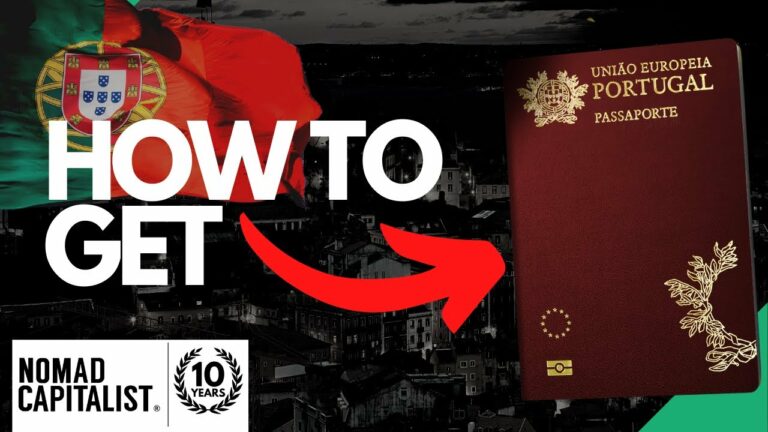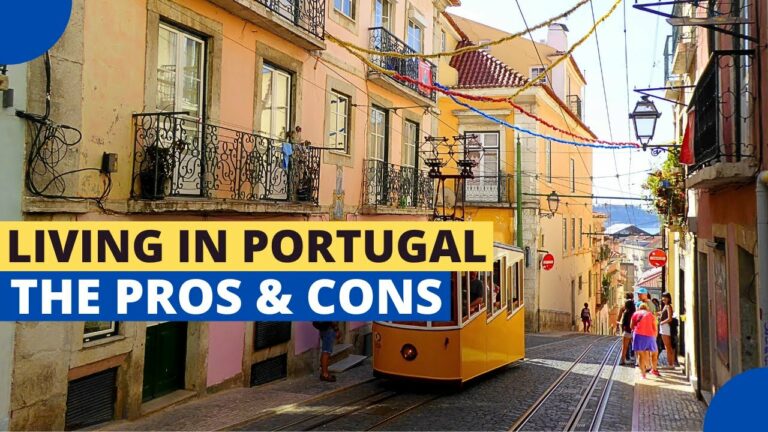Portugal’s Golden Visa Opportunities: A Freelancer’s Guide
As a seasoned expat and freelancer, I have lived and worked in several countries over the years, but one destination that stands out for its excellent quality of life and thriving freelance community is Portugal. This beautiful country, located on the western coast of Europe, offers a wealth of opportunities for freelancers looking to live and work abroad.
Personally, I have spent several years living in Portugal and have had a fantastic experience as a freelancer here. I’ve worked with clients from all over the world, enjoyed a relaxed and friendly lifestyle, and had the chance to explore the country’s vibrant culture and stunning natural beauty. In this guide, I’ll share some practical tips and advice for anyone considering a move to Portugal as a freelancer, based on my own experiences and insights. Whether you’re a seasoned freelancer or just starting out, this guide will provide you with all the information you need to make the most of this exciting opportunity.
Your Ultimate Guide to Freelancing in Portugal: Work Permits, Taxes, and Tips
If you’re a freelancer looking to move to Portugal, you’re in luck. With its beautiful weather, friendly locals, and affordable cost of living, Portugal has become a popular destination for digital nomads and freelancers alike.
Getting a Work Permit
If you’re from the European Union, you don’t need a work permit to work in Portugal. However, if you’re from a non-EU country, you’ll need to apply for a work visa. The process can take a few months, so it’s important to plan ahead.
To apply for a work visa, you’ll need to have a job offer from a Portuguese company or be self-employed. You’ll also need to provide proof of your qualifications and financial stability.
Paying Taxes
As a freelancer in Portugal, you’ll be responsible for paying your own taxes. The tax system in Portugal is relatively straightforward, but it’s important to understand your obligations.
You’ll need to register as a self-employed worker with the tax authorities and obtain a tax identification number. You’ll then need to file a tax return each year and pay your taxes on time.
The tax rates in Portugal are relatively low compared to other European countries, so you’ll have more money in your pocket to enjoy the beautiful country.
Tips for Living as a Freelancer in Portugal
Living as a freelancer in Portugal can be a wonderful experience, but it also comes with its own set of challenges. Here are some tips to help you navigate expat life in Portugal:
- Learn the language: While many Portuguese people speak English, learning the language will help you integrate into the local community and make new friends.
- Join expat groups: There are many expat groups in Portugal where you can meet other freelancers and digital nomads. They can provide valuable advice and support as you adjust to life in a new country.
- Find a good accountant: As a freelancer, you’ll need to keep track of your finances and file your taxes correctly. A good accountant can help you navigate the tax system and ensure that you’re compliant with the law.
- Embrace the culture: Portugal has a rich history and culture, and there’s so much to explore. Take the time to visit museums, attend festivals, and try the local cuisine.
- Stay connected: While living abroad can be exciting, it’s important to stay connected with friends and family back home. Make sure you have a good internet connection and schedule regular video calls.
Freelancing in Portugal: A Complete Guide to Taxes and Legal Obligations
If you are considering freelancing in Portugal, there are several legal obligations and tax requirements that you need to be aware of. As an expat, it can be overwhelming to navigate the Portuguese legal system, but with the right information, you can ensure that you are operating within the law and avoid any penalties.
Registering as a Freelancer
The first step to freelancing in Portugal is to register as a freelancer with Social Security. This process can be done online, and you will need to provide your personal details and tax identification number. Once registered, you will receive a Social Security number and a freelancer’s identification number.
Tax Obligations
As a freelancer in Portugal, you will be subject to income tax, social security contributions, and value-added tax (VAT). Your income tax rate will depend on your earnings, with rates ranging from 14.5% to 48%. Social security contributions are mandatory and are calculated based on your earnings.
Additionally, you will need to register for VAT if your annual earnings exceed €10,000. The VAT rate in Portugal is 23%, and you will need to charge VAT on your services if you are registered.
Keeping Records
It is important to keep accurate records of your earnings and expenses as a freelancer in Portugal. This includes invoices, receipts, and bank statements. You should also keep track of any VAT that you charge and pay.
Legal Obligations
As a freelancer in Portugal, you are required to issue invoices for your services. Invoices must include your freelancer identification number, the date of issue, and a description of the services provided. You should also keep copies of all invoices that you issue.
You are also required to file an annual tax return and submit quarterly VAT returns if you are registered for VAT. Failure to comply with these legal obligations can result in penalties and fines.
Practical Tips
Freelancing in Portugal can be a rewarding experience, but it is important to be aware of the legal and tax requirements. Here are some practical tips to help you navigate the system:
- Keep accurate records of your earnings and expenses
- Register for VAT if your earnings exceed €10,000
- Issue invoices for your services and keep copies
- File your annual tax return and VAT returns on time
- Consider hiring a local accountant to help you navigate the system
Freelancing in Portugal: A Comprehensive Guide on Moving, Living, and Working as a Freelancer Abroad
Moving abroad and working as a freelancer can be a daunting task, but Portugal provides a welcoming environment for those looking to live and work in a new country. As a freelancer who has lived and worked in Portugal for several years, I can attest to the ease of transitioning to the Portuguese lifestyle. In this guide, I will provide a comprehensive overview of everything you need to know about freelancing in Portugal, from moving abroad to cultural adaptation.
Moving Abroad
Moving to Portugal requires a bit of planning, but it is relatively straightforward. The first step is obtaining a visa, which can be done through the Portuguese consulate in your home country. The most common visa for freelancers is the D7 visa, which is for self-employed individuals. It is essential to prepare all the necessary documents, including proof of income and a criminal record check, before applying for the visa.
Once you have your visa, it is time to find a place to live. Portugal has a diverse range of housing options, from apartments in the city center to villas in the countryside. The most popular cities for expats are Lisbon and Porto, but there are also many charming towns and villages throughout the country.
Expat Life
As an expat in Portugal, it is crucial to understand the local culture and customs. Portuguese people are known for their friendly and welcoming nature, but it can take some time to adapt to their way of life. One of the best ways to immerse yourself in Portuguese culture is by learning the language. Portuguese is not a difficult language to learn, and many locals appreciate the effort taken by expats to speak their language.
Another essential aspect of expat life in Portugal is healthcare. The Portuguese healthcare system is excellent, but it is necessary to have private health insurance to cover the cost of any medical treatment. Many international insurance companies offer policies tailored to expats living in Portugal.
Investments
Portugal offers many investment opportunities for freelancers, including real estate and startups. The Portuguese government has implemented several programs to attract foreign investors, making it easier for freelancers to invest in the local economy. One of the most popular programs is the Golden Visa, which grants residency to individuals who invest a minimum of €500,000 in Portuguese real estate.
Real Estate
Portugal has become a popular destination for real estate investment, with many expats choosing to buy property in the country. The real estate market in Portugal is relatively stable, and property prices are still relatively low compared to other European countries. However, it is essential to work with a reputable real estate agent to ensure that the property is legally sound and meets all necessary regulations.
Cultural Adaptation
Adapting to a new culture can be challenging, but it is essential for freelancers to integrate into Portuguese society. Portuguese people are known for their relaxed and laid-back lifestyle, and it is essential to embrace this mindset. It is also important to understand the local customs and traditions, such as the importance of family and community.
With its welcoming culture, excellent healthcare system, and investment opportunities, Portugal has become a popular destination for expats. By following these practical tips and advice, freelancers can make a smooth transition to life in Portugal.
Freelancers’ Guide to Income Tax in Portugal: How to Calculate and Reduce Your Tax Burden
Portugal has become a popular destination for freelancers and digital nomads due to its warm climate, affordable cost of living, and vibrant culture. However, as a freelancer, you must be aware of your tax obligations in Portugal to avoid any legal issues and minimize your tax burden.
Who is Considered a Freelancer in Portugal?
In Portugal, freelancers are referred to as “trabalhadores independentes” and are defined as self-employed individuals who provide services to clients without a contract of employment.
How to Register as a Freelancer in Portugal?
As a freelancer in Portugal, you need to register with the tax authorities by obtaining a “NIF” (Número de Identificação Fiscal) and a “NISS” (Número de Identificação de Segurança Social). You can do this online or in person at a local tax office.
How to Calculate Income Tax as a Freelancer in Portugal?
As a freelancer in Portugal, you are subject to personal income tax (IRS) on your net income (income minus allowable expenses) at progressive rates ranging from 14.5% to 48%. The tax year in Portugal runs from January to December.
Here’s an example:
- You earn 30,000 euros as a freelancer in Portugal.
- You have allowable expenses of 5,000 euros.
- Your net income is 25,000 euros.
- Your income tax is calculated as follows: 14.5% on the first 7,112 euros, 23% on the next 10,732 euros, and 28.5% on the remaining 7,156 euros. Your total income tax liability is 5,287.32 euros.
It’s important to keep accurate records of your income and expenses to ensure that you pay the correct amount of tax. You also need to file an annual tax return by April 30th of the following year.
How to Reduce Your Tax Burden as a Freelancer in Portugal?
There are several ways to reduce your tax burden as a freelancer in Portugal:
- Deductible Expenses: You can deduct certain expenses related to your freelance work, such as office rent, equipment, and professional services.
- Retirement Savings: You can contribute to a private pension plan and receive tax benefits.
- Family Deductions: If you have dependent children or elderly relatives, you may be eligible for family deductions.
- Golden Visa: If you invest in Portugal and meet certain criteria, you may be eligible for a “Golden Visa” which grants you residency and tax benefits.
Portugal is becoming an increasingly attractive destination for freelancers, thanks to its welcoming culture, affordable cost of living, and thriving startup scene. While there are certainly challenges to overcome, such as navigating the bureaucracy and finding reliable work opportunities, those who make the move can enjoy a high quality of life and the chance to explore a beautiful and fascinating country. For anyone considering a move to Portugal, the main takeaways from this article are the importance of networking, the need to plan ahead when it comes to taxes and legal requirements, and the value of embracing the local culture and community. With these factors in mind, freelancers can make the most of everything that Portugal has to offer and build a successful and fulfilling career on their own terms.






